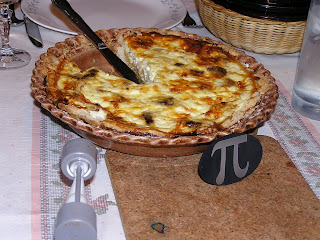 |
| NOT a quiche of death |
Here are the first lines of the 6 books I
finished reading in July. Fire, either
actual or metaphorical, is a prominent feature in several of them.
Book 1
Mrs. Agatha Raisin sat behind her newly
cleared desk in her office in South Molton Street in London’s Mayfair. From the outer office came the hum of voices
and the clink of glasses as the staff prepared to say farewell to her.
Book 2
The night Effia Otcher was born into the
musky heat of Fanteland, a fire raged through the woods just outside her
father’s compound.
Book 3
“Saturday evening,” remarked Isabel
Dalhousie. “A time for the burning of
the ears.”
Guy Peploe,
seated opposite her in the back neuk at Glass & Thompson’s café, looked at
her blankly. Isabel was given to making
puzzling pronouncements – he knew that, and did not mind – but this one, he
thought, was unusually Delphic.
Book 4
Chapter 1: A Good Café on the Place St.
Michel
Then there was the bad weather. It would come
in one day when the fall was over. You would have to shut the windows in the
night against the rain and the cold wind would strip the leaves from the trees
in the Place Contrescarpe. The leaves lay sodden in the rain and the wind drove
the rain against the big green autobus at the terminal and the Café des
Amateurs was crowded and the windows misted over from the heat and the smoke
inside.
Book 5
Marsh is not swamp. Marsh is a space of
light, where grass grows in water, and water flows into the sky.
Book 6
Isabel Dalhousie saw Brother Fox that morning
at eleven minutes past four.
The titles and authors revealed:
Book 1
Agatha Raisin and the Quiche of Death, by M.C. Beaton. ©
1992.
This print book needs editing – sometimes (at
least in the first chapter), the main character seems to have a different name.
It’s as if the author first intended to name her character Angela, and then
switched to Agatha, but there was no “find-replace all” option in 1992. Otherwise, an enjoyable “cozy mystery” – a
diversion from today’s news.
Book 2
Homegoing, by Yaa Gyasi. © 2016.
Homegoing is a historical novel, following
two parallel stories of a family through history – one branch in “Gold Coast”
(Ghana), Africa, the other branch in America. Each chapter is a vignette from a generation.
I chose it because Ta-Nehisi Coates said “Homegoing
is an inspiration.” Please note that it
includes many accounts of rape and other violence.
For its summer reading bingo, the library put
this book in the category of “Historical fiction with a female protagonist”,
but this is not at all a story with one protagonist. Like the author of Pachinko, Gyasi shows us how the experiences of previous
generations affect the following generation.
But this type of story is, I think, more work for the reader, and gives
less depth to each character. In Homegoing, the stories of each
generation are well-told and adequately connected to the previous generations.
I still think about certain characters from this book and their place in
history, so maybe there is plenty of depth to the characters after all, which just highlights the talent of the author.
Book 3
The Charming Quirks of Others, by
Alexander McCall Smith © 2010.
The 7th Isabel Dalhousie novel. More diversion.
Book 4
A Moveable Feast, by Ernest
Hemingway. © 1964.
I read for the second book club. I suggested it, having enjoyed it for the
first book club, but it was not as enjoyable for this second reading. The account of the car trip with F. Scott
Fitzgerald is now quite painful to read.
The two white male American writers drive through France in a car
without a top, drinking wine every time they pull over to the side of the road
to avoid the rain. And they get away with it – no repercussions. Hemingway is a truly
great writer, but also kind of a jerk.
I was intrigued by Hemingway’s use of the
pronoun “you” when he clearly was referring to himself – this technique is
evident even in the opening lines I quoted above. I thought it might be a way of distancing
himself from his own decisions, but it also draws the reader in and places us
right there in Paris in the 1920s. Yes,
a great writer.
Book 5
Where the Crawdads Sing, by Delia
Owens © 2018.
Good nature writing. Totally implausible plot. Where are the mosquitoes?
Book 6
The Perils of Morning Coffee by
Alexander McCall Smith. © 2011.
This is one of those teeny books you can get
only in e-format. A very short
book. Just what I needed.
2 comments:
I loved Homegoing. I always enjoy that style of short stories folded together into a longer read as she does. Definitely a literary feat.
Crawdads was good. It would make my top 10 list of last year's reads, but not the top 5 though.
SO hard to read Hemingway and Fitzgerald and the rest without setting aside modern sensibilities about sexism, racism, etc.
I just finished Crawdads over the weekend, and YES, THE ABSENT MOSQUITOES! I did really enjoy the poetic nature passages.
Post a Comment